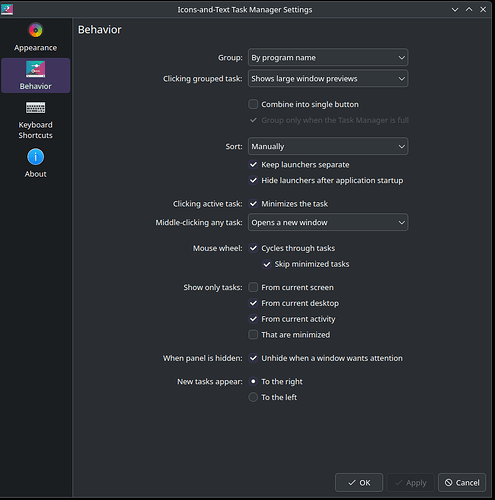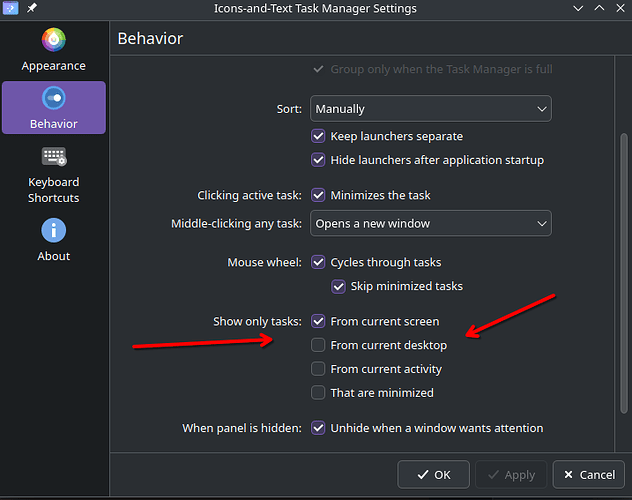IN case anyone needs this:
inxi --admin --verbosity=7 --filter --no-host --width
System:
Kernel: 6.13.5-arch1-1 arch: x86_64 bits: 64 compiler: gcc v: 14.2.1
clocksource: tsc avail: hpet,acpi_pm
parameters: initrd=\36da933937c74974a09b27660c5c1c2f\6.13.5-arch1-1\initrd
nvme_load=YES nowatchdog rw root=UUID=bfea1f9c-829d-49a4-8240-a6c4c59caa6a
resume=UUID=d1394196-b787-4e4b-88fd-5fa7252cbf4c nvidia_drm.modeset=1
systemd.machine_id=36da933937c74974a09b27660c5c1c2f
Desktop: KDE Plasma v: 6.3.2 tk: Qt v: N/A info: frameworks v: 6.11.0
wm: kwin_wayland vt: 1 dm: SDDM Distro: EndeavourOS base: Arch Linux
Machine:
Type: Desktop System: ASRock product: Z790 PG Lightning v: N/A
serial: <superuser required>
Mobo: ASRock model: Z790 PG Lightning serial: <superuser required>
uuid: <superuser required> UEFI: American Megatrends LLC. v: 16.02
date: 01/13/2025
Battery:
Device-1: hidpp_battery_0 model: Logitech Wireless Keyboard serial: <filter>
charge: 55% (should be ignored) rechargeable: yes status: discharging
Memory:
System RAM: total: 32 GiB available: 31.1 GiB used: 6.66 GiB (21.4%)
Message: For most reliable report, use superuser + dmidecode.
Array-1: capacity: 128 GiB slots: 4 modules: 2 EC: None
max-module-size: 32 GiB note: est.
Device-1: Controller0-ChannelA-DIMM0 type: no module installed
Device-2: Controller0-ChannelA-DIMM1 type: DDR5 detail: synchronous
size: 16 GiB speed: spec: 4800 MT/s actual: 5200 MT/s volts: curr: 1.25
min: 1.25 max: 1.25 width (bits): data: 64 total: 64 manufacturer: Corsair
part-no: CMK32GX5M2B5200C40 serial: N/A
Device-3: Controller1-ChannelA-DIMM0 type: no module installed
Device-4: Controller1-ChannelA-DIMM1 type: DDR5 detail: synchronous
size: 16 GiB speed: spec: 4800 MT/s actual: 5200 MT/s volts: curr: 1.25
min: 1.25 max: 1.25 width (bits): data: 64 total: 64 manufacturer: Corsair
part-no: CMK32GX5M2B5200C40 serial: N/A
CPU:
Info: model: 13th Gen Intel Core i9-13900K bits: 64 type: MST AMCP
arch: Raptor Lake gen: core 13 level: v3 note: check built: 2022+
process: Intel 7 (10nm) family: 6 model-id: 0xB7 (183) stepping: 1
microcode: 0x12C
Topology: cpus: 1x dies: 1 clusters: 12 cores: 24 threads: 32 mt: 8 tpc: 2
st: 16 smt: enabled cache: L1: 2.1 MiB desc: d-16x32 KiB, 8x48 KiB; i-8x32
KiB, 16x64 KiB L2: 32 MiB desc: 8x2 MiB, 4x4 MiB L3: 36 MiB desc: 1x36 MiB
Speed (MHz): avg: 1054 min/max: 800/5500:5800:4300 scaling:
driver: intel_pstate governor: powersave cores: 1: 1054 2: 1054 3: 1054
4: 1054 5: 1054 6: 1054 7: 1054 8: 1054 9: 1054 10: 1054 11: 1054 12: 1054
13: 1054 14: 1054 15: 1054 16: 1054 17: 1054 18: 1054 19: 1054 20: 1054
21: 1054 22: 1054 23: 1054 24: 1054 25: 1054 26: 1054 27: 1054 28: 1054
29: 1054 30: 1054 31: 1054 32: 1054 bogomips: 191692
Flags: 3dnowprefetch abm acpi adx aes aperfmperf apic arat
arch_capabilities arch_lbr arch_perfmon art avx avx2 avx_vnni bmi1 bmi2
bts clflush clflushopt clwb cmov constant_tsc cpuid cpuid_fault cx16 cx8
de ds_cpl dtes64 dtherm dts epb ept ept_ad erms est f16c flexpriority
flush_l1d fma fpu fsgsbase fsrm fxsr gfni hfi ht hwp hwp_act_window
hwp_epp hwp_notify hwp_pkg_req ibpb ibrs ibrs_enhanced ibt ida intel_pt
invpcid lahf_lm lm mca mce md_clear mmx monitor movbe movdir64b movdiri
msr mtrr nonstop_tsc nopl nx ospke pae pat pbe pcid pclmulqdq pconfig pdcm
pdpe1gb pebs pge pku pln pni popcnt pse pse36 pts rdpid rdrand rdseed
rdtscp rep_good sdbg sep serialize sha_ni smap smep smx split_lock_detect
ss ssbd sse sse2 sse4_1 sse4_2 ssse3 stibp syscall tm tm2 tpr_shadow tsc
tsc_adjust tsc_deadline_timer tsc_known_freq umip user_shstk vaes vme vmx
vnmi vpclmulqdq vpid waitpkg x2apic xgetbv1 xsave xsavec xsaveopt xsaves
xtopology xtpr
Vulnerabilities:
Type: gather_data_sampling status: Not affected
Type: itlb_multihit status: Not affected
Type: l1tf status: Not affected
Type: mds status: Not affected
Type: meltdown status: Not affected
Type: mmio_stale_data status: Not affected
Type: reg_file_data_sampling mitigation: Clear Register File
Type: retbleed status: Not affected
Type: spec_rstack_overflow status: Not affected
Type: spec_store_bypass mitigation: Speculative Store Bypass disabled via
prctl
Type: spectre_v1 mitigation: usercopy/swapgs barriers and __user pointer
sanitization
Type: spectre_v2 mitigation: Enhanced / Automatic IBRS; IBPB: conditional;
RSB filling; PBRSB-eIBRS: SW sequence; BHI: BHI_DIS_S
Type: srbds status: Not affected
Type: tsx_async_abort status: Not affected
Graphics:
Device-1: NVIDIA GA104 [GeForce RTX 3070 Ti] vendor: eVga.com. driver: nvidia
v: 570.124.04 alternate: nouveau,nvidia_drm non-free: 550/565.xx+
status: current (as of 2025-01; EOL~2026-12-xx) arch: Ampere code: GAxxx
process: TSMC n7 (7nm) built: 2020-2023 pcie: gen: 4 speed: 16 GT/s
lanes: 16 ports: active: none off: DP-2,DP-3 empty: DP-1,HDMI-A-1
bus-ID: 01:00.0 chip-ID: 10de:2482 class-ID: 0300
Display: wayland server: X.org v: 1.21.1.16 with: Xwayland v: 24.1.6
compositor: kwin_wayland driver: X: loaded: nvidia unloaded: modesetting
alternate: fbdev,nouveau,nv,vesa gpu: nvidia,nvidia-nvswitch
d-rect: 6000x1440 display-ID: 0
Monitor-1: DP-2 pos: right model: MSI MAG274QRF serial: <filter>
built: 2020 res: mode: 2560x1440 hz: 165 scale: 100% (1) dpi: 109 gamma: 1.2
size: 597x336mm (23.5x13.23") diag: 685mm (27") ratio: 16:9 modes:
max: 2560x1440 min: 640x480
Monitor-2: DP-3 pos: primary,left model: LG (GoldStar) ULTRAGEAR+
serial: <filter> built: 2024 res: mode: 3440x1440 hz: 240 scale: 100% (1)
dpi: 110 gamma: 1.2 size: 795x333mm (31.3x13.11") diag: 862mm (33.9")
modes: max: 3440x1440 min: 640x480
API: EGL v: 1.5 hw: drv: nvidia platforms: device: 0 drv: nvidia gbm:
drv: nvidia surfaceless: drv: nvidia wayland: drv: nvidia x11: drv: nvidia
API: OpenGL v: 4.6.0 vendor: nvidia v: 570.124.04 glx-v: 1.4
direct-render: yes renderer: NVIDIA GeForce RTX 3070 Ti/PCIe/SSE2
memory: 7.81 GiB display-ID: :1.0
API: Vulkan v: 1.4.304 layers: 1 device: 0 type: discrete-gpu name: NVIDIA
GeForce RTX 3070 Ti driver: N/A device-ID: 10de:2482
surfaces: xcb,xlib,wayland
Info: Tools: api: clinfo, eglinfo, glxinfo, vulkaninfo
de: kscreen-console,kscreen-doctor gpu: nvidia-smi wl: wayland-info
x11: xdpyinfo, xprop, xrandr
Audio:
Device-1: Intel Raptor Lake High Definition Audio vendor: ASRock
driver: snd_hda_intel v: kernel alternate: snd_soc_avs,snd_sof_pci_intel_tgl
bus-ID: 00:1f.3 chip-ID: 8086:7a50 class-ID: 0403
Device-2: NVIDIA GA104 High Definition Audio vendor: eVga.com.
driver: snd_hda_intel v: kernel pcie: gen: 4 speed: 16 GT/s lanes: 16
bus-ID: 01:00.1 chip-ID: 10de:228b class-ID: 0403
Device-3: HP HyperX Cloud Alpha Wireless
driver: cdc_acm,hid-generic,snd-usb-audio,usbhid type: USB rev: 2.0
speed: 12 Mb/s lanes: 1 mode: 1.1 bus-ID: 1-11:9 chip-ID: 03f0:098d
class-ID: 0a00 serial: <filter>
API: ALSA v: k6.13.5-arch1-1 status: kernel-api
tools: alsactl,alsamixer,amixer
Server-1: PipeWire v: 1.2.7 status: active with: 1: pipewire-pulse
status: active 2: wireplumber status: active 3: pipewire-alsa type: plugin
4: pw-jack type: plugin tools: pactl,pw-cat,pw-cli,wpctl
Network:
Device-1: Realtek RTL8125 2.5GbE vendor: ASRock driver: r8169 v: kernel pcie:
gen: 2 speed: 5 GT/s lanes: 1 port: 3000 bus-ID: 04:00.0 chip-ID: 10ec:8125
class-ID: 0200
IF: enp4s0 state: up speed: 1000 Mbps duplex: full mac: <filter>
IP v4: <filter> type: dynamic noprefixroute scope: global
broadcast: <filter>
IP v6: <filter> type: noprefixroute scope: link
Device-2: NetGear Wireless_Device driver: mt7921u type: USB rev: 3.2
speed: 5 Gb/s lanes: 1 mode: 3.2 gen-1x1 bus-ID: 2-7.1:4 chip-ID: 0846:9060
class-ID: 0000 serial: <filter>
IF: wlan0 state: down mac: <filter>
Info: services: NetworkManager, systemd-timesyncd, wpa_supplicant
WAN IP: <filter>
Bluetooth:
Message: No bluetooth data found.
Logical:
Message: No logical block device data found.
RAID:
Message: No RAID data found.
Drives:
Local Storage: total: 20.03 TiB used: 10.23 GiB (0.0%)
SMART Message: Unable to run smartctl. Root privileges required.
ID-1: /dev/nvme0n1 maj-min: 259:5 vendor: Western Digital
model: WD BLACK SN770 2TB size: 1.82 TiB block-size: physical: 512 B
logical: 512 B speed: 63.2 Gb/s lanes: 4 tech: SSD serial: <filter>
fw-rev: 731130WD temp: 41.9 C scheme: GPT
ID-2: /dev/nvme1n1 maj-min: 259:0 vendor: Intel model: SSDPEKNW010T8
size: 953.87 GiB block-size: physical: 512 B logical: 512 B speed: 31.6 Gb/s
lanes: 4 tech: SSD serial: <filter> fw-rev: 002C temp: 36.9 C scheme: GPT
ID-3: /dev/nvme2n1 maj-min: 259:4 vendor: Samsung model: SSD 980 PRO with
Heatsink 2TB size: 1.82 TiB block-size: physical: 512 B logical: 512 B
speed: 63.2 Gb/s lanes: 4 tech: SSD serial: <filter> fw-rev: 5B2QGXA7
temp: 44.9 C scheme: GPT
ID-4: /dev/sda maj-min: 8:0 vendor: Seagate model: ST12000VN0008-2PH103
size: 10.91 TiB block-size: physical: 4096 B logical: 512 B speed: 6.0 Gb/s
tech: HDD rpm: 7200 serial: <filter> fw-rev: SC61 scheme: GPT
ID-5: /dev/sdb maj-min: 8:16 vendor: Seagate model: ST4000DM004-2CV104
size: 3.64 TiB block-size: physical: 4096 B logical: 512 B speed: 6.0 Gb/s
tech: HDD rpm: 5425 serial: <filter> fw-rev: 0001 scheme: GPT
ID-6: /dev/sdc maj-min: 8:32 vendor: Samsung model: SSD 870 EVO 1TB
size: 931.51 GiB block-size: physical: 512 B logical: 512 B speed: 6.0 Gb/s
tech: SSD serial: <filter> fw-rev: 2B6Q scheme: GPT
Message: No optical or floppy data found.
Partition:
ID-1: / raw-size: 918.66 GiB size: 903.17 GiB (98.31%) used: 9.85 GiB (1.1%)
fs: ext4 dev: /dev/nvme1n1p2 maj-min: 259:2 label: endeavouros
uuid: bfea1f9c-829d-49a4-8240-a6c4c59caa6a
ID-2: /efi raw-size: 1024 MiB size: 1022 MiB (99.80%)
used: 387.9 MiB (38.0%) fs: vfat dev: /dev/nvme1n1p1 maj-min: 259:1
label: N/A uuid: B065-9F66
Swap:
Kernel: swappiness: 60 (default) cache-pressure: 100 (default) zswap: no
ID-1: swap-1 type: partition size: 34.21 GiB used: 0 KiB (0.0%)
priority: -2 dev: /dev/nvme1n1p3 maj-min: 259:3 label: swap
uuid: d1394196-b787-4e4b-88fd-5fa7252cbf4c
Unmounted:
ID-1: /dev/nvme0n1p1 maj-min: 259:6 size: 16 MiB fs: <superuser required>
label: N/A uuid: N/A
ID-2: /dev/nvme0n1p2 maj-min: 259:7 size: 1.82 TiB fs: ntfs label: Games
uuid: EC9063C6906395BC
ID-3: /dev/sda1 maj-min: 8:1 size: 16 MiB fs: <superuser required>
label: N/A uuid: N/A
ID-4: /dev/sda2 maj-min: 8:2 size: 10.91 TiB fs: ntfs label: Media
uuid: F884CC3F84CBFE5E
ID-5: /dev/sdb1 maj-min: 8:17 size: 3.64 TiB fs: ntfs label: Personal
uuid: 32066AB6066A7AAD
ID-6: /dev/sdc1 maj-min: 8:33 size: 100 MiB fs: vfat label: N/A
uuid: A6D4-CC08
ID-7: /dev/sdc2 maj-min: 8:34 size: 16 MiB fs: <superuser required>
label: N/A uuid: N/A
ID-8: /dev/sdc3 maj-min: 8:35 size: 930.4 GiB fs: ntfs label: N/A
uuid: 01DA45628E0EB110
ID-9: /dev/sdc4 maj-min: 8:36 size: 1 GiB fs: ntfs label: N/A
uuid: 01DA45631BA52EA0
USB:
Hub-1: 1-0:1 info: hi-speed hub with single TT ports: 16 rev: 2.0
speed: 480 Mb/s (57.2 MiB/s) lanes: 1 mode: 2.0 chip-ID: 1d6b:0002
class-ID: 0900
Hub-2: 1-2:2 info: ASMedia ASM1074 High-Speed hub ports: 4 rev: 2.1
speed: 480 Mb/s (57.2 MiB/s) lanes: 1 mode: 2.0 power: 100mA
chip-ID: 174c:2074 class-ID: 0900
Device-1: 1-4:3 info: Logitech Nano Receiver type: keyboard,mouse
driver: logitech-djreceiver,usbhid interfaces: 2 rev: 2.0
speed: 12 Mb/s (1.4 MiB/s) lanes: 1 mode: 1.1 power: 98mA
chip-ID: 046d:c534 class-ID: 0301
Device-2: 1-6:17 info: Google Nexus/Pixel Device (MTP) type: still imaging
driver: N/A interfaces: 1 rev: 2.1 speed: 480 Mb/s (57.2 MiB/s) lanes: 1
mode: 2.0 power: 500mA chip-ID: 18d1:4ee1 class-ID: 0601 serial: <filter>
Hub-3: 1-7:5 info: VIA Labs Hub ports: 4 rev: 2.1
speed: 480 Mb/s (57.2 MiB/s) lanes: 1 mode: 2.0 chip-ID: 2109:2210
class-ID: 0900
Hub-4: 1-8:6 info: Genesys Logic Hub ports: 3 rev: 2.0
speed: 480 Mb/s (57.2 MiB/s) lanes: 1 mode: 2.0 power: 100mA
chip-ID: 05e3:0610 class-ID: 0900
Device-1: 1-8.3:14 info: Micro Star MSI Gaming Controller type: HID
driver: hid-generic,usbhid interfaces: 1 rev: 1.1 speed: 12 Mb/s (1.4 MiB/s)
lanes: 1 mode: 1.1 power: 100mA chip-ID: 1462:3fa4 class-ID: 0300
serial: <filter>
Device-2: 1-10:7 info: NZXT USB Device type: HID
driver: nzxt_kraken3,usbhid interfaces: 1 rev: 2.0 speed: 12 Mb/s (1.4 MiB/s)
lanes: 1 mode: 1.1 power: 100mA chip-ID: 1e71:2007 class-ID: 0300
serial: <filter>
Device-3: 1-11:9 info: HP HyperX Cloud Alpha Wireless
type: audio,HID,abstract (modem),CDC-data
driver: cdc_acm,hid-generic,snd-usb-audio,usbhid interfaces: 6 rev: 2.0
speed: 12 Mb/s (1.4 MiB/s) lanes: 1 mode: 1.1 power: 100mA
chip-ID: 03f0:098d class-ID: 0a00 serial: <filter>
Device-4: 1-13:10 info: ASRock LED Controller type: HID
driver: hid-generic,usbhid interfaces: 1 rev: 1.1 speed: 12 Mb/s (1.4 MiB/s)
lanes: 1 mode: 1.1 power: 100mA chip-ID: 26ce:01a2 class-ID: 0300
serial: <filter>
Hub-5: 2-0:1 info: super-speed hub ports: 9 rev: 3.1
speed: 20 Gb/s (2.33 GiB/s) lanes: 2 mode: 3.2 gen-2x2 chip-ID: 1d6b:0003
class-ID: 0900
Hub-6: 2-7:2 info: VIA Labs Hub ports: 1 rev: 3.0
speed: 5 Gb/s (596.0 MiB/s) lanes: 1 mode: 3.2 gen-1x1 chip-ID: 2109:0210
class-ID: 0900
Device-1: 2-7.1:4 info: NetGear Wireless_Device type: Network
driver: mt7921u interfaces: 1 rev: 3.2 speed: 5 Gb/s (596.0 MiB/s) lanes: 1
mode: 3.2 gen-1x1 power: 160mA chip-ID: 0846:9060 class-ID: 0000
serial: <filter>
Hub-7: 2-9:3 info: ASMedia ASM1074 SuperSpeed hub ports: 4 rev: 3.0
speed: 5 Gb/s (596.0 MiB/s) lanes: 1 mode: 3.2 gen-1x1 power: 8mA
chip-ID: 174c:3074 class-ID: 0900
Sensors:
System Temperatures: cpu: 36.0 C mobo: N/A
Fan Speeds (rpm): N/A
Info:
Processes: 466 Power: uptime: 4h 21m states: freeze,mem,disk suspend: deep
avail: s2idle wakeups: 1 hibernate: platform avail: shutdown, reboot,
suspend, test_resume image: 12.38 GiB services: org_kde_powerdevil,
power-profiles-daemon, upowerd Init: systemd v: 257 default: graphical
tool: systemctl
Packages: pm: pacman pkgs: 1021 libs: 241 tools: yay Compilers: gcc: 14.2.1
Shell: Bash v: 5.2.37 running-in: konsole inxi: 3.3.37

